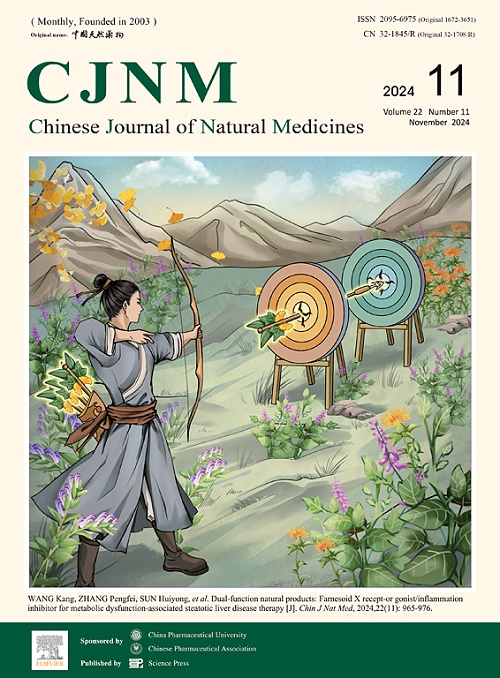针对心肌梗死新机制的天然产物干预
IF 4.9
2区 医学
Q1 INTEGRATIVE & COMPLEMENTARY MEDICINE
引用次数: 0
摘要
心肌梗死是一种高发病率和死亡率的心血管疾病(CVD),可引发一系列心脏病理生理变化,包括纤维化、炎症、缺血再灌注损伤(IRI)和心室重构,最终导致心力衰竭(HF)。虽然传统的药物治疗和临床再灌注治疗可以提高短期预后和急诊生存率,但这两种方法都有局限性和副作用。天然产物(NPs)在全球范围内被广泛用作治疗药物,其中一些在临床前和临床药理学研究中显示出潜在的良好治疗效果,将其定位为现代药物的潜在替代品。本文综述了心肌梗死的病理生理机制,并对NPs对心脏有益作用的机制进行了综述。这些包括经典机制,如抑制炎症和氧化应激,减轻心肌细胞死亡,减轻心脏纤维化,改善血管生成,以及新兴机制,如心脏代谢调节和组蛋白修饰。此外,该综述还强调了NPs在经典机制中对新靶点或信号通路的调节,包括其他形式的细胞死亡调节(RCD)、内皮-间质转化、非编码核糖核酸(ncrna)级联和内皮祖细胞(EPC)功能。此外,影响特定机制的NPs根据其化学结构进行了分类,并讨论了它们的相关性。最后,考虑了NPs治疗目前的局限性和前景,强调了它们在心肌梗死治疗中的应用潜力,并确定了需要紧急关注的问题。本文章由计算机程序翻译,如有差异,请以英文原文为准。
Intervention of natural products targeting novel mechanisms after myocardial infarction
Myocardial infarction is a cardiovascular disease (CVD) with high morbidity and mortality, which can trigger a cascade of cardiac pathophysiological changes, including fibrosis, inflammation, ischemia-reperfusion injury (IRI), and ventricular remodeling, ultimately leading to heart failure (HF). While conventional pharmacological treatments and clinical reperfusion therapy may enhance short-term prognoses and emergency survival rates, both approaches have limitations and adverse effects. Natural products (NPs) are extensively utilized as therapeutics globally, with some demonstrating potentially favorable therapeutic effects in preclinical and clinical pharmacological studies, positioning them as potential alternatives to modern drugs. This review comprehensively elucidates the pathophysiological mechanisms during myocardial infarction and summarizes the mechanisms by which NPs exert cardiac beneficial effects. These include classical mechanisms such as inhibition of inflammation and oxidative stress, alleviation of cardiomyocyte death, attenuation of cardiac fibrosis, improvement of angiogenesis, and emerging mechanisms such as cardiac metabolic regulation and histone modification. Furthermore, the review emphasizes the modulation by NPs of novel targets or signaling pathways in classical mechanisms, including other forms of regulated cell death (RCD), endothelial-mesenchymal transition, non-coding ribonucleic acids (ncRNAs) cascade, and endothelial progenitor cell (EPC) function. Additionally, NPs influencing a particular mechanism are categorized based on their chemical structure, and their relevance is discussed. Finally, the current limitations and prospects of NPs therapy are considered, highlighting their potential for use in myocardial infarction management and identifying issues that require urgent attention.
求助全文
通过发布文献求助,成功后即可免费获取论文全文。
去求助
来源期刊

Chinese Journal of Natural Medicines
INTEGRATIVE & COMPLEMENTARY MEDICINE-PHARMACOLOGY & PHARMACY
CiteScore
7.50
自引率
4.30%
发文量
2235
期刊介绍:
The Chinese Journal of Natural Medicines (CJNM), founded and sponsored in May 2003 by China Pharmaceutical University and the Chinese Pharmaceutical Association, is devoted to communication among pharmaceutical and medical scientists interested in the advancement of Traditional Chinese Medicines (TCM). CJNM publishes articles relating to a broad spectrum of bioactive natural products, leading compounds and medicines derived from Traditional Chinese Medicines (TCM).
Topics covered by the journal are: Resources of Traditional Chinese Medicines; Interaction and complexity of prescription; Natural Products Chemistry (including structure modification, semi-and total synthesis, bio-transformation); Pharmacology of natural products and prescription (including pharmacokinetics and toxicology); Pharmaceutics and Analytical Methods of natural products.
 求助内容:
求助内容: 应助结果提醒方式:
应助结果提醒方式:


